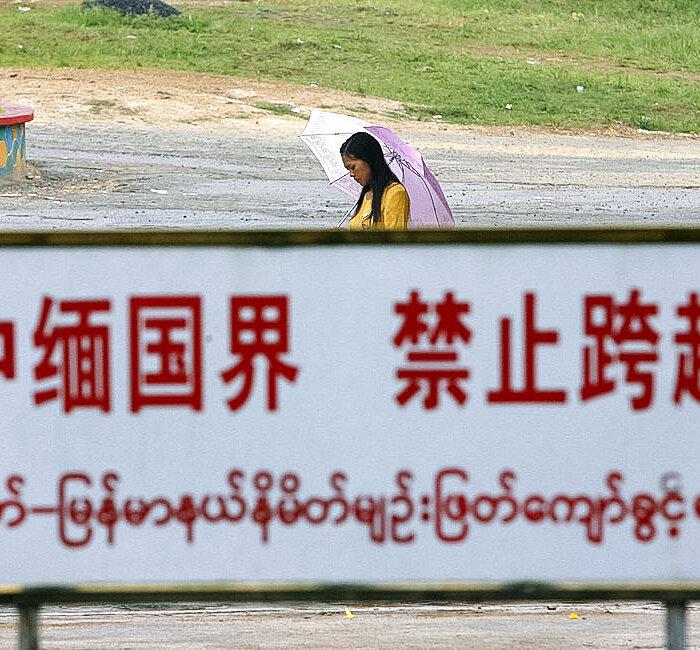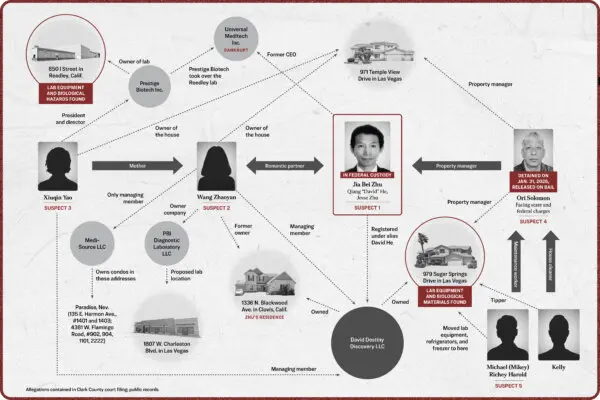Erin West watched as a Chinese jet touched down at the airport in tropical Mae Sot, Thailand.
It was the first of 20 such flights, taking thousands of Chinese nationals away from a life of forced labor in the vast prison-like scam center compounds across the border in Burma (also known as Myanmar).
West, a former California prosecutor who now campaigns against cyberscammers, had arrived in Mae Sot just after a China-led crackdown in February, in which Burmese militias removed nearly 8,000 human-trafficked workers from scam compounds in Burma’s Myawaddy area, near the Thai–Burma border.
Despite the much publicized crackdown, West said she is convinced China could do much more to tackle what she says is a global crisis.
West told The Epoch Times that China was able to rapidly evacuate 5,000 of its people out of Burma, while many other countries struggled with red tape to fly their citizens home.
Meanwhile, hundreds of freed scam center workers from a range of other countries still languish in makeshift camps in Burma, unsure as to when they will get home and terrified that they’ll be returned to the scam compounds.

West has spent the better part of a decade chasing cybercriminals. A former deputy district attorney in Santa Clara, California, she joined an elite cybercrime task force in 2016. In 2024, she retired and founded Operation Shamrock—a coalition of experts from the law enforcement, finance, civil, and tech sectors who fight transnational organized crime.
She said she is convinced that the action against the scam centers was a “fake crackdown” engineered by the Chinese Communist Party (CCP).
Matthew Hogan, a detective with the Connecticut State Police and an officer on the Secret Service’s Financial Crimes Task Forces, agrees with West’s assessment. He told The Epoch Times that he has no doubt that the CCP is behind the Burma scam centers.
The Scam: ‘Pig Butchering’
West told The Epoch Times that she spent the past three years of her 26-year career investigating long-term scams known as “pig butchering,” which involve luring people into fake cryptocurrency investments.The scamming strategy has been perfected in recent years by the cybercriminals who run the southeast Asian compounds.
The phrase comes from the Chinese term “sha zhu pan,” which directly translates to “killing pig plate.”
As the name implies, pig butchering is a technique in which online scammers “fatten up” their victims patiently over a period of time, and when the time is ripe, dupe them out of large sums of money.
Hogan describes a typical pig butchering scam, in which the victim notices comments on a LinkedIn profile or a social media post, or perhaps someone reaches out through Instagram, or even an apparent wrong number text.
The scammer’s profile photo might show a young, attractive Asian woman. Stereotypical scammers “don’t shy away from the fact that they’re Chinese,” Hogan said. “Either they’ll mention in every message, [or] at some point, that ... they’re Asian or Chinese, and they’re in the U.S. working for a business.”
At first, the contact may seem innocuous, with low-key, chatty or flirtatious comments. Wealth is implied, if not stated: perhaps a photo of the young woman in a sports car, or a comment that she’s looking to buy a Rolex.
The scammer builds trust and spins a romantic web over time. “It usually takes a couple weeks, if not months, to even bring up the fact of investment,” Hogan said.
Eventually, the scammer “butchers the pig,” persuading the victim to invest in a fraudulent cryptocurrency scheme or an investment scam. The scammer’s apparently affluent lifestyle seems to give credibility to their advice. And by now, the scammer knows the victim well and can suggest just how much to invest.

Once the victim—little dreaming that his female friend is actually a man operating out of a compound in Southeast Asia—has parted with his money, he finds himself ghosted. The pain of a breakup adds to the embarrassment of a financial loss.

Hogan said the scripts used by scammers when stalking their victims are skillfully crafted. “We know for a fact” that the cybercriminals “are using their illicit funds to pay [people with] Ph.D.s to assist in writing the scripts that they use to scam victims, so there’s a lot of education and skill behind the targeting,” he said.
The cost of pig butchering scams and other global cybercrime is expected to be a staggering $10.5 trillion annually this year, according to cyber economy researcher Cybersecurity Ventures.
Hogan said the phenomenon is inducing victims to invest their life savings, take out home equity lines of credit or second mortgages, and even lose their homes. They’re liquidating 401(k)s and college savings accounts.
“We’ve had the whole gamut,” he said. “It really is a crisis.”
The Scammers: The 1st Victims
The workers in the vast cybercrime hives are the first victims, falling prey to slick advertising that promises them lucrative jobs. They come from a long list of countries.Hogan said potential workers are often recruited for their tech skills or because they speak the language of potential victims—usually English or Chinese.
They may be recruited through direct contact, through social media, or through ads.

Everything seems above board. There may be multiple interviews, and eventually the recruited employee is given an airline ticket.
“It all looks very, very legitimate,” West said, “Until they arrive, and their passports are taken from them, their phones are taken, and they’re forced to scam 16 hours a day.”
West said most of the workers in the scam centers are fooled by glossy advertisements that portray idyllic white collar jobs.
“It’s a super sophisticated operation from the top to the bottom,” she said.
Amy Miller, regional director of Acts of Mercy International, a relief and development organization, told The Epoch Times: “This is a new form of human trafficking. It’s human trafficking for forced criminality.”


Workers in the scam compounds spend 12 hours to 16 hours each day in front of computers, reaching out to victims around the world using fake social media profiles. If they don’t meet targets, they may be beaten or physically punished. If they refuse to cooperate, they may be tortured. They may be handcuffed to desks. Contact with the outside world is cut off or clandestine.
Hundreds of former scam center workers—many of them from Africa—are still trapped in Burma, hoping for repatriation. Living conditions in the camps where they are held are dismal, with little food and unsanitary conditions.
Almost 500 of them are housed in a camp run by Burma’s Democratic Karen Benevolent Army (DKBA) militia.
On April 13, Miller told The Epoch Times, about 270 of the workers carried out an “organized protest” in a bid to leave Burma but were forced to return to the camp after armed members of the DKBA threatened to return them to the scam compounds.
“We hope [the protest] was successful to get them moved to the [Border Guard Force (another militia)] camp, which will help them in their process toward repatriation,” she said.

Following the Profits to Beijing
With a cybercrime industry that generates billions of dollars, West said, “there’s a lot of money unaccounted for.” That money points to Beijing, she said.“There are only so many McLarens and Lamborghinis that the kingpins can buy; there are only so many beautiful homes in Sydney that can be bought,” West said.
With “tens or hundreds of billions of dollars” unaccounted for, she said, “it is hard to believe that China would not be benefiting from that in some way.”
The benefits to the CCP go beyond direct financial benefit, West said, and include access to the South China Sea or access to Taiwanese citizens. “There are some very visible benefits to China,” she said.
Ultimately, West said, when it comes to Chinese involvement, if the Chinese were not involved in enabling the vast human-trafficking operation in some way, they would “be more interested in shutting it down.” However, they have shown very little interest in doing so, she said.
“It’s almost a proof by absence of evidence otherwise,” West said. “It doesn’t make sense otherwise.”
“The fact that they’re not stopping what is a massive global crisis, makes me wonder, ‘why not?’”
As further evidence, she points to something that became clear to her as she watched Chinese planes land and efficiently remove thousands of freed scam center workers. China looks the other way—until its own nationals are victimized. And then it is quickly able to produce results.
The recent crackdown had its roots in the abduction, in early January, of a minor Chinese celebrity.
Wang Xing, a Chinese actor who had small parts in the film “Ip Man 3” and the television series “The Tale of Rose,” went missing after being tricked into traveling to Thailand on the pretext of doing some filming.

After his girlfriend turned to social media to publicize the disappearance, authorities became involved and Wang was rescued from a scam center across the border in Burma, where he had already undergone training in how to conduct scam phone calls.
The incident became a major news story in China, and Beijing’s consulates in Thailand, Burma, and Cambodia began warning their citizens.
On Jan. 9, China’s state-run China Daily ran an opinion piece that said, “China must urgently enhance cooperation with its Southeast Asian neighbors and implement more effective measures to combat telecom fraud and its associated criminal networks.”
In early February, Thai Prime Minister Paetongtarn Shinawatra traveled to Beijing to discuss the matter, West said, and “all of a sudden, this alleged crackdown in Myanmar.”
She said the incident shows that “China can have a large influence when they want to.”
West said China has publicly made it clear that “if you are trying to bring more Chinese people into the human traffic workforce, or if you are directly attacking Chinese citizens, we will get involved—and we can see that after the issue with the actor [Wang Xing].”
“It makes it appear to me that China is less interested in really putting their foot down, because they sure could,” West said.
She saw Beijing’s decisive influence in Mae Sot. “It was very swift. The Chinese came, and they sort of ran roughshod over Thailand’s sovereignty, and picked up their people and took them out,” West said.
“No other nation was given that same ability to secure their own citizens.”
After the departure, West said, she spoke with Kenya’s ambassador and witnessed his frustration. “He had a plane and he was ready to get his people out, and it was incredibly difficult and a lot of red tape for him to do it, whereas China showed up, grabbed their people and moved them out,” she said.

The incident suggests that Burma’s government and its allied militias all “answer to China,” she said.
Belt and Road
West said Chinese organized crime is heavily involved in cyberscam compounds in Burma, Cambodia, and Laos, and has a “foothold” in several African countries. China’s Belt and Road Initiative is a significant reason for the regime to turn a blind eye to cybercrime in those countries.She pointed to Cambodia as an example. There is a “massive uptick” in cybercrime in Cambodia, she said, and “there’s no way China doesn’t know that,” given the ties between the two nations.
But, under the Belt and Road Initiative, the Cambodian government has provided Beijing with a strategically important naval base in Ream, so China looks the other way, West said.
She pointed to “a lot of dangerous posturing and movement” between China and Cambodia, with “favors that are being granted both ways.”

West said Chinese organized crime has come a long way from the early 1990s, when Hong Kong- and Macao-based triads—traditional organized crime groups—made most of their money from extortion rackets within the Chinese community.
“Quite frankly, they should be feared at the level of any evil-doing nation state,” she said. “They’re that big; they’re that organized; they’re that well-funded.
“The amount of money that is being transferred from regular people that you know, into the hands of bad actors is stunning.”
West discussed a pivotal figure in the world of Chinese organized crime: Wan Kuok-koi, nicknamed “Broken Tooth,” the Macao-based leader of the 14K triad, one of the largest Chinese organized crime organizations.
In a statement at the time, the Treasury Department said Wan was a member of the CCP’s Chinese People’s Political Consultative Conference. The 14K triad is responsible for drug trafficking, illegal gambling, racketeering, human trafficking, and “a range of other criminal activities,” it said.
According to West, the 14K and other triads originally ran casinos in Cambodia. The casinos catered to Chinese customers who are forbidden to gamble in China.

Highly profitable casinos were set up in places such as Sihanoukville, Cambodia, which was transformed from a sleepy coastal town into a gambling mecca.
West said: “So they built these massive structures, and then COVID hit, and people weren’t moving. And so they realized, ‘We’ve got these big towers that are sitting here empty. What can we do with them?’”
She said that is when the triads turned to romance fraud and pig butchering scams, which initially targeted Chinese victims.
After the COVID-19 pandemic, most of the casinos went back to gambling operations, but the triads moved the cyberscam operations to purpose-built centers in other parts of Cambodia and in Burma.
West said they then turned their attention to targeting individuals in the United States and began bringing in African workers “because they needed English speakers.”
This was a new development, different from Indian call centers, or Nigerian sweatshops. “This was a major change in how business was being conducted,” West said.
Safe Havens for Crime
Mina Chiang, founder of UK-based Humanity Research Consultancy, told The Epoch Times that in both Cambodia and Burma, the cyberscam industry is massive—an “industrial scale operation.”While some major Chinese organized crime groups are involved in building the physical compound infrastructure, she said, a diverse range of criminal groups rent the spaces to carry out various specialized scams. They’re a safe haven for crime.

Chiang said Burma had undergone a construction boom because of the Belt and Road Initiative. Now, much of that construction has been repurposed by crime groups who realized that “actually the scam industry is the most lucrative one.”
“With the civil war in [Burma], and the border militias there, [it] becomes very convenient to go in this direction,” she said.
Chiang said the levels of brutality faced by the scam workers in the compounds vary. Some “try to maintain, at surface level at least, [that] it’s a normal job, and they don’t beat you on a regular basis,” she said.
As the fraud syndicates have turned their attention away from Chinese and Taiwanese victims, “the Chinese government’s response has focused mainly on protecting its citizens from being scammed,” she said.
“As a result, there is a common understanding among scam compounds in recent years—if you want to keep operating, just avoid targeting Chinese citizens.”

West said Chinese organized crime is somewhat of an uninvestigated area.
She said that she recognized the unmet need when she first became involved in investigating pig butchering scams. “It became obvious rather quickly that there was a need for expertise in this area, that we were being hit by a type of crime that we had not seen at this scale and met this intensity before,” West said.
“There was no blueprint for how to do this work. ... We were dealing with people losing all of their money, every penny they had.”
















